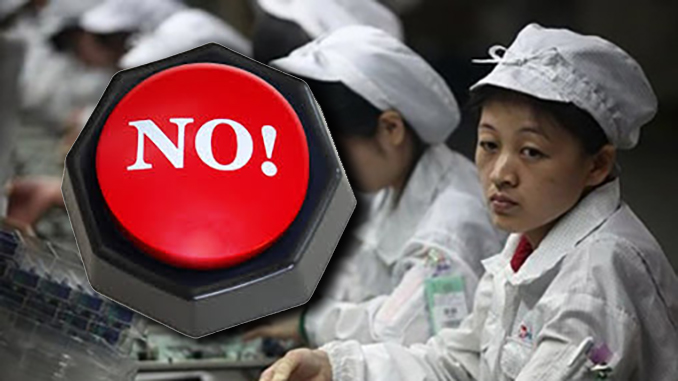
By Donald Jeffries
The coronavirus outbreak has demonstrated all too clearly how decades of terrible decisions and harmful trade policies have left America vulnerable in the face of such a crisis. The U.S. is dependent upon China for many of its prescription medications. This country last made penicillin in 2004. Drugs imported from China are distributed to millions of pharmacies and hospitals, as well as veterans’ medical facilities and military bases. The U.S. has virtually no ability to manufacture its own antibiotics. It has been estimated that more than 90% of active ingredients in antibiotics come from China.
Other crucial drugs manufactured in China include chemotherapy medications, antidepressants, insulin, birth control pills, and those that treat diseases like Alzheimer’s, HIV/AIDS, Parkinson’s, and epilepsy. Politico recently reported that in 2018, 95% of U.S. imports of ibuprofen came from China, and 91% of hydrocortisone.
The U.S. also imports virtually all of its electronic products, and the vast majority come from China. This includes not only computers and video game consoles, but medical diagnostic devices. A huge number of our plastics come from China, along with clothing, textiles, and fabrics. We import large numbers of other products like home appliances, baby strollers and equipment, and countless other consumer items.
Any American is apt to find “Made in China” labels in their homes and might not find any “Made in USA” tags (and even some of those are made by Chinese workers in U.S. territories). While all this reliance on cheaply produced goods from other countries, particularly China, has resulted in lower prices for consumers—and unimaginable corporate profits—it is a shortsighted strategy that has destroyed American industry and weakened our national sovereignty.
Donald Trump’s tough talk on China and punitive tariffs on their imports were strongly criticized by the Deep State establishment, which invariably labels any efforts to restore independent production in this country as “protectionism.”
Many companies are taking a closer look at their reliance on China in light of the coronavirus, which has caused inevitable delays in shipping orders. “The coronavirus shows the importance of bringing manufacturing back to America so that we are producing at home the medicines and equipment and everything else that we need to protect the public’s health,” Trump said earlier this month.
Despite his rhetoric, however, there doesn’t appear to be a significant manufacturing renaissance on the horizon in America. Globalist corporations like Nike have reduced their reliance upon China but have merely switched to alternative sources of cheap labor in Vietnam and other parts of Southeast Asia. They aren’t opening factories in this country. Apple, infamous for its slave-labor factories in China, has told investors it wasn’t going to meet current quarter revenue projections. But CEO Tim Cook will undoubtedly follow Nike’s lead and pursue other cheap labor options, in lieu of turning to domestic production.
 South Korea, Japan, and Italy have all been hit hard by the coronavirus, causing further disruption in global supply lines. Commerce Secretary Wilbur Ross singled out Apple’s China centric production system as an indictment of the global economy. “Globalization has gotten out of control. It takes 200 suppliers in 43 countries on six continents to make an iPhone,” Ross said in a speech in February.
South Korea, Japan, and Italy have all been hit hard by the coronavirus, causing further disruption in global supply lines. Commerce Secretary Wilbur Ross singled out Apple’s China centric production system as an indictment of the global economy. “Globalization has gotten out of control. It takes 200 suppliers in 43 countries on six continents to make an iPhone,” Ross said in a speech in February.

“We have got a military medical system, and we have the same access to all the drugs that are available in the commercial system, etc.,” Joint Chiefs Chairman Mark Milley recently declared at a congressional hearing. “You rightly pointed out that it is a vulnerability to have a country such as China manufacturing high percentages—I don’t know if it is 97%, 98% or 80%, whatever it is, but I do know it is high percentages of the ingredients to [the] American pharmaceutical industry across the country, both military and civilian. . . . In a time of armed conflict—if that were ever to happen, hopefully it will never happen—that would obviously be a significant vulnerability to the United States.”
Needless to say, in any potential conflict with China, America would be in an extremely worrisome position, totally dependent upon an enemy for many essential products. The slow drift from a production to a service economy has not only been devastating for blue-collar wages but is potentially crippling for economic independence and military strength. Pat Buchanan has written and spoken eloquently on this subject for many years. In late 2018, he warned, “The Chinese have an economic nationalist policy and have had one for 30 years. The whole idea is to hold the value of their currency down in order to export massively to the world and in effect transfer industries and production from countries like the United States into China.” Buchanan noted that China has an approximately $4 trillion trade surplus with the United States.
Can Donald Trump or anyone else restore American industry? If he can, the time is now to make his case to the American people.
Donald Jeffries is a highly respected author and researcher whose work on the JFK, RFK and MLK assassinations and other high crimes of the Deep State has been read by millions of people across the world. Jeffries is also the author of three books currently being sold by the AFP Online Store.




